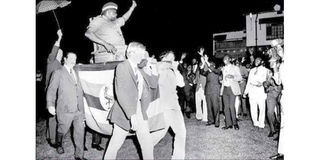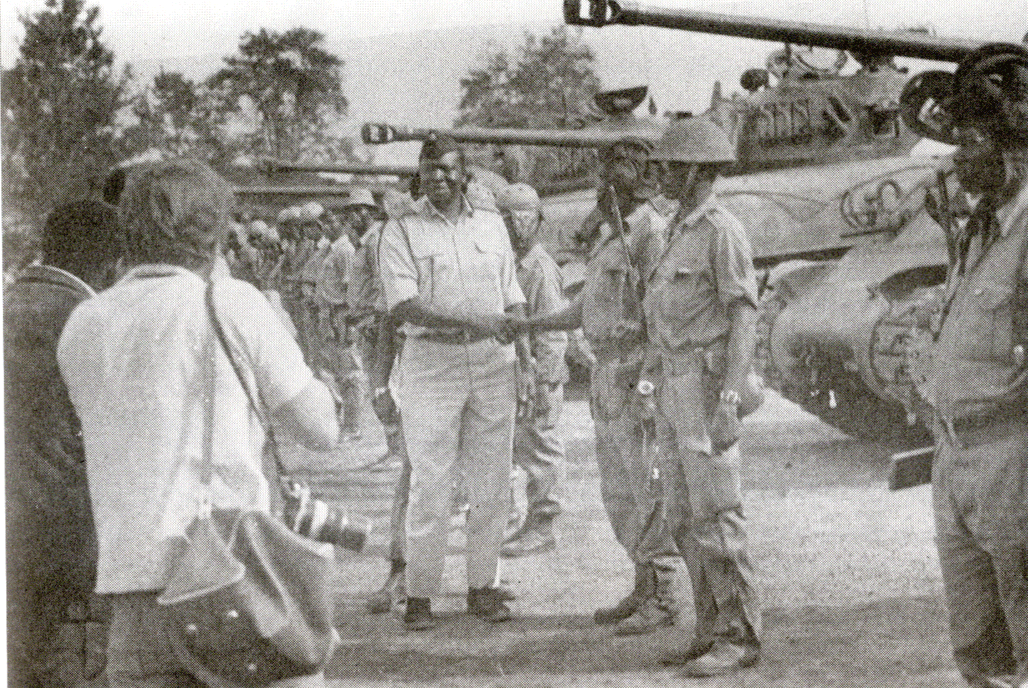Prime
Unfulfilled pledges and how Amin fell out with the West

Ex-president Idi Amin is carried by British businessmen during a party for diplomats in Kampala in 1975. PHOTOS/ FILE
What you need to know:
- By the beginning of 1972, diplomatic tensions between Amin and his allies had taken a new twist. Both Britain and Israel had not fulfilled Amin’s expectations of arms supplies.
On July 11, 1971, about six months after the 1971 coup that ousted former president Milton Obote, then president Idi Amin left Uganda for Israel and Britain, stopping over in Addis Ababa, Ethiopia, and Paris, France.
From his early days in the army, Amin is said to have admired the British. He also had a reason to befriend the Israelis. The latter had trained him to be a paratrooper.
Before the 1971 coup, there were several Israelis in Uganda in military and technical fields and most of them were said to be Amin’s close associates since he had helped them to channel their logistic and weaponry to the southern Sudan-based Anyanya rebels.
Arrival in Israel
In Israel, a 72-man guard of honour greeted Amin at Lod airport, Tel Aviv. He was received by foreign minister Abba Eban and defence minister Moshe Dayan. Accompanied by his foreign minister Wanume Kibedi, Amin was sped away for talks with then Israeli prime minister Golda Meir.
According to the book To Those Who Have Died, Amin wanted Israel to expand their military training programme in Uganda and sell him the “selected arms” to fight what he called “the impending aggression” from then Tanzanian president Julius Nyerere and Sudanese counterpart Gen Jaffar Niemeri whom he accused of plotting to attack Uganda in a bid to reinstate Obote.
Meir told Amin that his request would be considered by the Knesset (Israeli parliament) but reminded him that Israel did not manufacture such weapons as they were in most cases imported from either USSR or the USA.
The following morning, he was ushered into a meeting with Yaakov Hertzog, the director general in the prime minister’s office; Simcha Dinitz, Meir’s political adviser; Brig Israel Loir, the prime minister’s military secretary; Ya’acov Shimon of the foreign ministry; and Brig Yitzhak Bar-On from the Israeli defence ministry.
The book says Israel was taking Amin very seriously. Amin boarded his Israeli-built white Commodore executive jet and Israelis offered him their pilot, Col Shapiro.
He proceeded to Britain where he was accorded an equally warm welcome. The Ugandan party quickly drove from Gatwick airport to a London hotel where Amin shed out of his uniform and squeezed himself into a dinner jacket and stretched white shirt complete with bow-tie. He attended a dinner at prime minister Edward Heath’s official residence, No 10 Downing Street.
At the dinner was British foreign secretary Alec Douglas-Home and several British officials. The next day, Amin met then defence minister Lord Corrington and the two talked about the Harrier Jets and Saracen armoured cars which Amin wanted to purchase.
He later met aid minister John Woodto whom Amin suggested the British “prolong” loan agreements to Uganda, affecting some £30m debt payments. Britain shortly showed willingness to Amin’s suggestion by announcing an additional £10m aid programme to Uganda.
The following morning, he spoke to Ugandan students in the conference hall at London Uganda House. He later had lunch with Queen Elizabeth II and Prince Phillip at Buckingham Palace before proceeding to the Royal Military Academy, Sandhurst.
The Ugandan president was then flown to Scotland in an aircraft of the Queen’s Flight bound for Edinburgh (the queen’s official residence).
In both Israel and Britain, Amin had increasingly claimed that his country was facing external threats – Tanzania in the south and Sudan in the north. Amin had then asked both Israel and Britain for military supplies that would help him avert the threats.
However, up to the end of 1971, no such supply had arrived which sowed Amin deep-seated hatred towards his former allies. The honeymoon was soon over.
Fallout
By the beginning of 1972, diplomatic tensions between Amin and his allies had taken a new twist. Both Britain and Israel had not fulfilled Amin’s expectations of arms supplies and prolonged loan agreements.
In February 1972 Amin, fed up with what he called British lies and travelling back from West Germany, decided to pay an abrupt visit to Libyan president Muammar Gadaffi. The book says Amin badly wanted financial and military support and the West had declared conditions that Amin had to meet before such donations were released; assessing the democratic situation and level of human rights abuses in Uganda.
In their meeting, the book notes, Gadaffi informed Amin that his government could not deal effectively with a colleague who was collaborating with his enemies (Israelis). The condition put to Amin was to immediately denounce the Israeli government.
On his arrival, Amin started fierce denunciation of Israel by uttering insulting remarks to the Jewish community in Uganda through the media. This drew protests from the Israeli ambassador in Uganda.
Amin claimed that multiple construction contracts the Israelis had been undertaking since Obote’s regime were drowning the economy. Without warning, in April 1972, he expelled the ambassador, shut down the Israeli embassy and ordered the rest of what he called “Zionists” to leave Uganda within 10 days.
A week later, Amin turned against the British too. In March, some 12,000 Asians applying for Ugandan citizenship had their application suddenly cancelled. The military authorities were mulling a new neutralisation conditions believed to be aimed at about the 5,000- strong Asian community, a large proportion which held dual British-Ugandan nationality.
Soon, at a meeting at the OAU Conference Centre (Nile Hotel) in Kampala where representatives attending the Ugandan Cooperatives Day, mainly Asians, had gathered.
Amin said: “Asians came to Uganda to build railways. The railway is now finished. They must leave now.”
He gave them 90 days to pack up and leave.
Seizure of British firms
When Amin expelled Asians, the British cancelled a £12m loan programme to Uganda and the US, angered by Amin’s Hitler telegram, stopped a $10m loan. Amin had sent a telegram to the United Nations saying: “Germany was the right place where, when Hitler was the prime minister [sic], he burned over six million Jews.”
Amin hit back at Britain by recalling Uganda’s ambassador in London and expelling the British High Commissioner from Uganda.
He announced that all the foreign-owned businesses – more than 40 of them – would be redistributed among Black Ugandans. This action prompted the British government’s reaction by phasing out their technical assistance to Uganda.
Amin threatened “drastic measures” against British nationals in Uganda. As a result, many of the estimated 2,000 British families in Uganda began planning their departure.
Mocking allies
The book records that in early 1973, Amin said the British government was too broke to survive and he was willing to take over the responsibility from Queen Elizabeth as a head of the Commonwealth.
He went ahead to announce what he called “Save Britain Fund”, adding that he had started the fund with a contribution of Shs10,000 from his pocket to help Britain survive its economic crisis.
“I am appealing to all people of Uganda who have all along been the traditional friends of the British people to come forward and help their former colonial masters,” he announced over Radio Uganda.
Days later, he sent a telegraph to prime minister Heath informing him that the British economic plight was an embarrassment to the Commonwealth nations, adding that he was able to offer advice to help avert the British economic ill.
Amin did not attend the 1973 Commonwealth conference in Montreal, Canada, because Britain “did not fulfil his conditions” that Queen Elizabeth would send an aircraft for him, “complete with a company of Scots Guards and the Commonwealth secretary general should provide me with a pair of size 13 shoes”.
In the speech read for him to the summit by his Foreign minister, Lt Col Michel Ondoga, Amin accused Britain of racism and not having the guts to stand up to Rhodesian (Zimbabwean) prime minister Ian Smith.
Around the same time, he attacked the US over the plight of the Black Americans. In early 1974, Amin summoned then American chargé d’affaires Robert Keeley and British High Commissioner James Hennessey at his command post in Kololo.
He told the diplomats that he had received intelligence reports that the British, Israeli and American commandos were about to parachute into Uganda, saying he had directed his troops to arrest any Briton and American on Kampala streets without identity papers.
Following several provocations, the US government on November 10, 1973 closed its embassy in Kampala.
As Washington’s embassy staff packed up to leave Kampala, trusting the welfare of the remaining Americans to the West German embassy, Amin announced that his Defence Council was considering drastically reducing its diplomatic representation in the US, perhaps keeping only one person in the Washington embassy.




